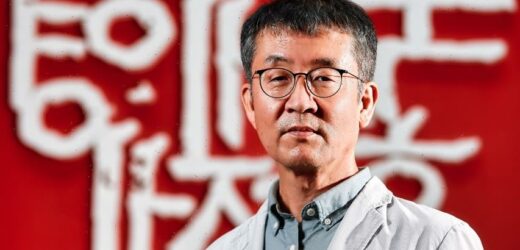After two years of holding in-person but stripped down editions of the festival, South Korea’s Busan International Film Festival (BIFF, October 5-14) is back in full force this year with a packed line-up of screenings, red carpets, parties, awards and industry events.
The masks will stay on, at least in indoor spaces, but with Korea’s borders open, the festival is welcoming a large number of international filmmakers and industry guests. BIFF’s main venue, the Busan Cinema Center, will host opening and closing ceremonies; Hong Kong actor Tony Leung Chiu-wai will be honoured as Asian Filmmaker Of The Year; and stars are expected to attend the Asian Contents Awards, scheduled for October 8, which recognise drama series and other streaming content.
Film competition sections include New Currents, for emerging Asian filmmakers, and the new Jiseok section. The festival’s On Screen section, introduced last year to focus on drama series, will screen nine series including Lee Joon-ik’s Yonder, Takashi Miike’s Connect and The Kingdom Exodus, from Lars von Trier.
Busan’s industry platform, Asian Contents & Film Market (ACFM, October 8-11), which was forced online by the pandemic, will be held as an in-person event for the first time since 2019.
BIFF director Huh Moonyung, spoke to Deadline about what’s new this year, the return to ‘near’ normality and the global success of Korean content. Huh has a long association with the festival as he was previously head of the Busan Cinema Center and has also worked as the festival’s Korean cinema programmer.
DEADLINE: Will this year be a return to normal in terms of screenings, parties, events, audience size and international participation?
HUH MOONYUNG: This year’s festival will be almost back to normal, because there are still some Asian countries that are not fully free from the Covid safety guidelines, and the participation of film professionals from those countries is still limited. However, this year, we’ve resumed the production support programs that have been on hold for the past two years, such as Asian Cinema Fund (ACF), Asian Film Academy (AFA), and Platform Busan. It feels as if we are finally repaying the debt that we owe the Asian filmmakers for the past two years.
Also, we’ll be using 100% of the seats in the theaters, as opposed to last year’s 50%, and restoring all audience participation events. We hope that our film festival can be like the clear blue sky after the storm has passed.
DL: Korea’s global profile was raised massively by the success of Parasite and Squid Game, but the pandemic made it difficult to capitalise on this. Now life is getting back to normal, are those successes having any impact on international interest in BIFF and ACFM?
HMY: We’re always cautious of overestimated pride, but we expect that such a situation will undoubtedly have a positive impact. The reason for the BIFF’s quick growth when it was founded in 1996 was due to the background in which there was a sudden rise of Korean and Asian films. We assess that, in the past two years, the international credibility and demand for Korean content has grown largely, not only in films, but in overall storytelling content. The Busan Story Market, which was launched by ACFM this year, also sprouted from this trust and demand. Of course, we plan to discover stories from all Asian countries through the Busan Story Market, not only Korea.
DL: Why introduce the new Jiseok competition section? How does it differ from the existing New Currents section?
HMY: The Kim Jiseok Award, which was started in 2017 to commemorate the memory of the late program director, Kim Jiseok (1960-2017), was awarded to winners from a selection of eight to ten films from the ‘A Window on Asian Cinema Today’ section, which shows works from Korean and Asian directors who have participated in more than three films.
We decided that the value of this award needs to be further accentuated, so expanded it into an independent section to highlight the world premiere films by Korean and Asian directors. Of course, the New Currents sections, which targets films by newly emerging Asian directors, will still remain a core section for BIFF.
DL: In your opinion, which Asian countries and their films are thriving creatively at the moment, and which have suffered during the pandemic?
HMY: Unlike the early 2000s, during which the Japanese film industry seemed to be in a stagnant period, many new talents have been discovered in the past ten years. Promising young directors who will follow and succeed Hamaguchi Ryusuke [Drive My Car] are being discovered continuously. This is the reason we prepared a Special Program in Focus, Discovering New Japanese Cinema. On the other hand, the Chinese film industry is perceived to be facing relatively many difficulties due to the pandemic. However, as the Chinese film industry has boundless potential, I do not expect this hardship to last.
DL: Last year BIFF launched the On Screen section. Will there be any other moves to incorporate streaming and episodic content into the festival this year?
HMY: I expected that the On Screen section would cause controversy. This is because many people still do not accept drama series in the category of movies. However, we believe that the concept of movies is going through a radical change, and series will soon be considered “movies” in a wide understanding of the word. Last year, this section exceeded our expectations and gathered explosive interest from the audience and series creators. As a result, we were able to increase the number of selections from last year’s three to a total of nine this year. This section will continue to expand.
DL: Will there be any Covid restrictions at BIFF and ACFM? Or any online elements?
HMY: Apart from wearing masks indoors, almost all restrictions regarding Covid are gone, although the mandatory PCR test within 24 hours of arrival is still in place. As for online elements, ACFM is preparing online screening so that the market selections can be viewed online. For those who are unable to visit Busan, they will be able to access the films through ACFM. Some BIFF events will be streamed on YouTube. However, BIFF still believes that a festival should be a face-to-face event, and is preparing many event and programs in line with that belief.
Must Read Stories
SAG-AFTRA To Pursue Pay For Auditions Under Specific Circumstances
Disney’s Figment Character Getting Movie From Hernandez, Samit & Point Grey
Reporter Hit By Flying Branch Live On-Air; Closures & More On Historic Cat 4 Storm
WB Discovery CEO David Zaslav On Rumored Merger Talks: “We Are Not For Sale”
Read More About:
Source: Read Full Article






